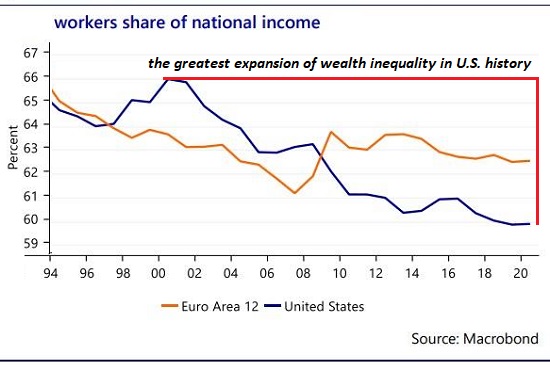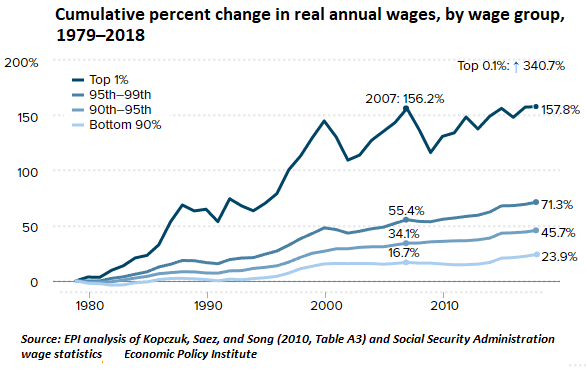Why Nations Fail
Nations that appear stable may fail once they're under pressure. What do I mean by "under pressure"? Pressure can come from many sources: invasion, civil war, prolonged scarcities of essentials, natural disasters, financial crises, droughts, pandemics and social disorder triggered by inequality and corruption.
Pressure diminishes the availability of resources, and exacerbates inequalities as political favoritism divides "winners" (elites protected and enriched by state intervention) at the expense of the "losers," i.e. the commoners, who bear the brunt of job losses, financial risks, scarcities, and deprivations.
There are two dynamics in systemic pressure: forces that weaken resilience and adaptability, and forces that strengthen adaptability. Nations fail when their status quo is focused on protecting the ruling elites at the expense of the nation's overall adaptability to rapidly changing circumstances.
1. In ecosystems, as the entire population suffers a reduction in resources, average individual fitness declines. This is why droughts and floods that lead to famine are typically followed by pandemics, as those with weakened immune systems succumb to diseases that spread quickly in refugee camps, crowded cities (where starving rural populations congregate seeking food) and towns where basic sanitation crumbles under the onslaught of reduced tax revenues, scarcities and higher death rates.
In the developed world, even if the populace has enough food, heightened financial and other stresses lead to burnout, breakdowns and other manifestations of social unraveling.
As average individual fitness declines, pressures mount on social, political and economic systems. If these systems are ineffectual, brittle, sclerotic and optimized for corruption and elite incompetence, these second-order effects of systemic pressure may be enough to push the nation into non-linear disorder. (Non-linear = small actions can trigger large consequences in unpredictable ways.)
2. Resilient systems achieve their dynamic equilibrium (i.e. stability) from what Nobelist Ilya Prigogine called "order through fluctuation." This is a concept that manifests in a number of fields, including self-organization and natural selection, in which the constant flow of random mutations generates a pool of fluctuations that enable the species or society to adapt successfully to change.
When there is relatively little pressure from environmental changes, species can remain unchanged for tens of millions of years. The variability of mutations continues but there are few selective pressures to favor a mutation over the existing genome.
In eras of rapid environmental change, organisms can undergo an explosion of genetic experimentation that leads to new adaptations. This is the punctuated equilibrium model of selective pressure and adaptation: when systemic pressure is low, there's no need for bursts of experimentation and adaptation. But when systemic pressure soars, it's adapt or die.
We can understand variability as competition: mutations compete with the existing system's coding and the most successful variants spread because they outcompeted existing processes.
In human political systems, this constant flow of competing variability is dissent and the competition of ideas. Ironically, the first response of human leaders in centralized hierarchies (monarchies, totalitarian and authoritarian regimes, theocracies, plutocracies, kleptocracies, etc.) when their nation comes under pressure is to further consolidate power into the hands of the few and immediately suppress dissent of any kind as a threat to the regime's power and control.
The irony is that the suppression of dissent is the suppression of competing ideas that generate systemic stability via rapid adaptation. Stripping their nation of dissent is in effect stripping it of the dynamics of successful adaptation and rapid evolution-- precisely the traits a nation needs to navigate eras of rapid change.
This is why so many nations and empires fail when they come under pressure: as their subsystems break down and unravel, rather than encourage the competition of ideas and variability, i.e. dissent, they suppress dissent as a threat to their power, effectively dooming their nation to decay and collapse. Once the capacity to adapt and evolve has been crippled, collapse is the only possible outcome.
These dynamics are in play globally. Many and perhaps most nation-states will fail as their elites suppress dissent and new ideas that threaten their power but which ironically are the only means to evolve successfully to rapidly changing circumstances.



More By This Author:
The Most Valuable Form of Money Nobody's Seen - YetWhy the Housing Bubble Bust Is Baked In
The Global Power Shift Isn't West to East - It's Not That Simple
Disclosures: None.



